一般现在时态,现在进行时态,一般过去时态,一般将来时态讲解及专项练习
初中一般现在时,一般过去时,一般将来时,现在进行时总结练习
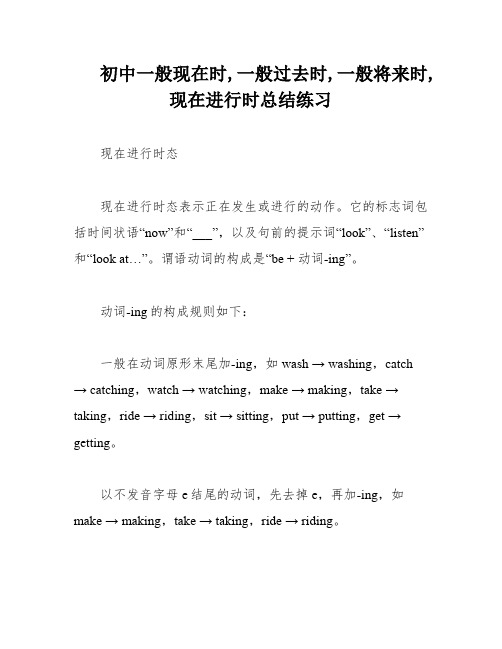
初中一般现在时,一般过去时,一般将来时,现在进行时总结练习现在进行时态现在进行时态表示正在发生或进行的动作。
它的标志词包括时间状语“now”和“___”,以及句前的提示词“look”、“listen”和“look at…”。
谓语动词的构成是“be + 动词-ing”。
动词-ing的构成规则如下:一般在动词原形末尾加-ing,如wash → washing,catch→ catching,watch → watching,make → making,take → taking,ride → riding,sit → sitting,put → putting,get → getting。
以不发音字母e结尾的动词,先去掉e,再加-ing,如make → making,take → taking,ride → riding。
以重读闭音节(辅元辅)结尾的动词,双写末尾辅音,再加-ing,如sit → sitting,put → putting,get → getting。
特殊的动词现在分词形式包括lie → lying。
现在分词的练:helping,coming,swimming,eating,giving,finding,sitting,writing,___,making,playing,cleaning,catching,walking,riding,running,drawing,listening,beginning,dancing,watching,sleeping,seeing,having。
填空练:1.Look。
The boy is reading books.2.The girls are having breakfast now.3.___。
No。
___’t.4.___ ___.5.Listen。
They are singing in the music room. 汉译英练:1.___.2.Tom is reading books in the library.3.___ ___.4.He is ___.5.What is Maria doing now?1.Are you doing your homework?2.I am not running on the playground.3.Is she dancing in the gym。
(完整版)四种时态及其练习(完整版)
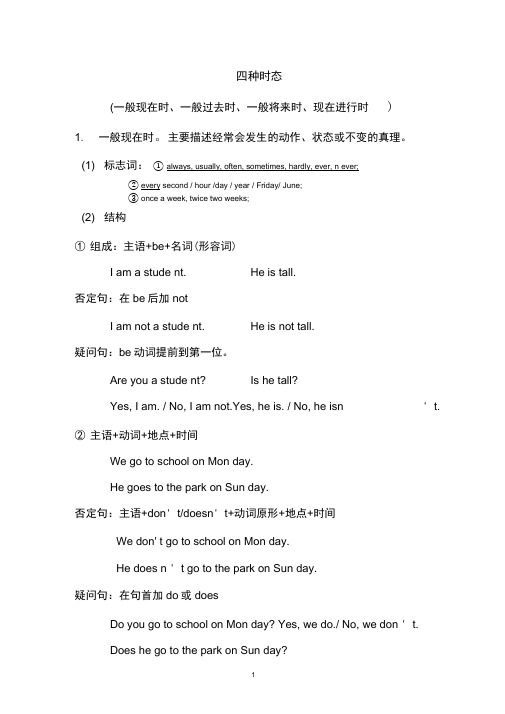
四种时态(一般现在时、一般过去时、一般将来时、现在进行时)1. 一般现在时。
主要描述经常会发生的动作、状态或不变的真理。
(1) 标志词:① always, usually, often, sometimes, hardly, ever, n ever;②every second / hour /day / year / Friday/ June;③once a week, twice two weeks;(2) 结构①组成:主语+be+名词(形容词)I am a stude nt. He is tall.否定句:在be后加notI am not a stude nt. He is not tall.疑问句:be动词提前到第一位。
Are you a stude nt? Is he tall?Yes, I am. / No, I am not.Yes, he is. / No, he isn ' t.②主语+动词+地点+时间We go to school on Mon day.He goes to the park on Sun day.否定句:主语+don' t/doesn' t+动词原形+地点+时间We don' t go to school on Mon day.He does n ' t go to the park on Sun day.疑问句:在句首加do或doesDo you go to school on Mon day? Yes, we do./ No, we don ' t.Does he go to the park on Sun day?Yes, he does./ No, he does n (3) 动词三单变化:① 在原单词末尾加s ,如:like - likes② 单词以 o, sh, ch, s, x 结尾力口 es,女口: go - goes ③ 单词末尾为辅音+y 结尾去y 加ies 女口: study- studies 2.现在进行时:主要叙述正在发生的事情。
初中英语语法-八种时态详解与练习
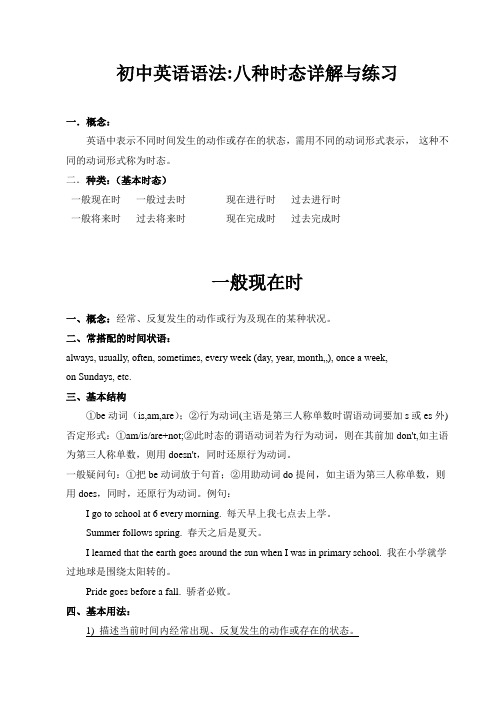
初中英语语法:八种时态详解与练习一.概念:英语中表示不同时间发生的动作或存在的状态,需用不同的动词形式表示,这种不同的动词形式称为时态。
二.种类:(基本时态)一般现在时一般过去时现在进行时过去进行时一般将来时过去将来时现在完成时过去完成时一般现在时一、概念:经常、反复发生的动作或行为及现在的某种状况。
二、常搭配的时间状语:always, usually, often, sometimes, every week (day, year, month…), once a week,on Sundays, etc.三、基本结构①be动词(is,am,are);②行为动词(主语是第三人称单数时谓语动词要加s或es外) 否定形式:①am/is/are+not;②此时态的谓语动词若为行为动词,则在其前加don't,如主语为第三人称单数,则用doesn't,同时还原行为动词。
一般疑问句:①把be动词放于句首;②用助动词do提问,如主语为第三人称单数,则用does,同时,还原行为动词。
例句:I go to school at 6 every morning. 每天早上我七点去上学。
Summer follows spring. 春天之后是夏天。
I learned that the earth goes around the sun when I was in primary school. 我在小学就学过地球是围绕太阳转的。
Pride goes before a fall. 骄者必败。
四、基本用法:1) 描述当前时间内经常出现、反复发生的动作或存在的状态。
在这种情景中,句子常带有表示频率的时间状语:always , everyday , often , once a week (month , year , etc.) , sometimes , seldom , usually等等,以表示句中的动作或状态是习惯性的、经常性的。
四大时态(一般现在时、一般过去时、一般将来时、现在进行时)练习

小学阶段,主要学四大时态:一般现在时:指动作发生在“现在”的时间段内。
那么,多长的时间才叫“现在”呢?一个月?一年?10年、100年?这就要根据动作的性质来定了。
“现在”这个概念可短可长,只要在目前这个动作是经常发生的就行。
一般过去时:表示过去某个时间里发生的动作或存在的状态,常和表示过去的时间状语连用,如:yesterday,last night,in 1990,two days ago等。
一般将来时:一般将来时表示将来某一时刻的动作或状态,或将来某一段时间内经常的动作或状态。
常常和表示将来的时间状语连用。
如:tomorrow(明天),next w eek(下周),from now on(从现在开始);in the future(将来)等。
一般将来时由助动词shall(第一人称),will(第二、三人称)动词原形构成。
美国英语则不管什么人称,一律用will。
现在进行时:表示动作发生的时间是“现在”,动作目前的状态是“正在进行中”。
所谓“正在进行中”,是指在谈到这件事的时候,这个动作还在进行中。
至于它是什么时候开始的,什么时候会停下来,不是我们关心的。
所以“正在进行时”的事件,可能发生几年了,也可能只有几分钟。
仍在进行中这是“正在进行时”的关键所在。
时态练习--过去时1.Tom and Mary_______ (come) to China last month.2.Mike ________ (not go) to bed until 12 o’clock last night. So he________ (get ) up late.3. We _______ (not watch)TV last Monday.4. I ______(feel) hot and________(have a fever) last night.5.We _______ (read)this story book last week.6. ----_______ you______(get)me a copy of today’s newspaper?----OK.8.What time_______ you _______ (leave for) Beijing yesterday?9.What _____________ (make) him cry (哭) just now?10. The earth ______ (move) around the sun.11. I_______ (be) ill. I’m staying in bed.12.I________ (have) an exciting party last weekend.13. He ______(get) up at six o’clock every day.14. My classmate and I _______ (see)a film on TV last Thursday.15. My mother_______ (say)she had a headache last night.16. Jacket’s sister______________________(do some housework) last Sunday.17. We_______ (get) to Beijing at 9:00 this evening.18.There___________ enough milk at home last week, wasn’t there?19. They_________(be) on the farm a moment ago.20. How many lessons______ your classmate usually________(have) on Monday?21. Jenny ________ (not go)to bed until 11:00 o'clock last night.22. There __________(be) a telephone call for you just now.23. Jack ________ (not clean) the room just now.24. ---- _______ you______(be)here tomorrow?----No. I _________(visit)my teacher.1. My brother ___________ basketball with his classmate after school this Friday.A. is going to playB. going to playC.plays2. Mr. Brown_________ tomorrow.A. goes fishingB. will go fishingC. go fishing3.Tom _________ his pen friend every day.A. e-mailsB. is going to e-mailC. e-mail4. Look, the children________ in the park.A. are having funB. is having funC. are going to have fun5. Jan_______ the Night Zoo by car next week.A. visitB. visitsC. is going to visit1. We _________(have, had) a science lesson yesterday afternoon.2. I _______(called, call) you this morning, but you _________(was, were) not in.3. ___________(Does, Did) she play computer games last night?4. I’ll come back_________(soon, yesterday).5. Ben_______(have) noodles for breakfast this morning.6. Jiamin usually _________(go) to school on foot, but this morning he________(go) to school by bus.7. Miss White ___________________(not come) to work yesterday, because she ____________(is) ill.8. Mr.Webb ___________(love) his car very much. Now he is____________(wash) his car.9. Xiaoling___________(finish) her homework and __________(play) video games yesterday.10. I _________(call) Mr and Mrs Webb yesterday, but they __________(be) not at home.1. Let’s go to the park and _________some photos of the peach flowers.A. takeB. makeC. took2. I did not go for a trip, I stayed in Guangzhou and _________ three films.A. seeB. seeingC. saw3. Yesterday afternoon, Xiaoming ___________computer games for three hours.A. playB. playsC. played4. I ___________ noodles for breakfast yesterday.A. am havingB. haveC. had5. We________ more homework now than before.A. haveB. hasC. had6. Don’t worry, Mrs Lee. Your daughter _________ all right soon.A. isB. will beC. won’t be。
初中英语各种时态的讲解及练习

初中英语各种时态的讲解及练习一关于时态。
时态其实是指的两个概念:其一是指时间,其二是指:在不同的时间条件下动词的形式。
时间上英语主要分为三段:过去时间,现在时间和将来时间。
动词的形式有五种,情态动词除外。
(原型do、三单does、现在分词doing、过去式did、过去分词done)。
其实时态主要就是在考察动词。
因此同学们一定要有这个意识:只要一说起时态我们就要去关注谓语动词怎么变化(用什么样的形式)二、初中阶段主要要掌握以下8种时态:1.现在类的时态1.一般现在时态:2.现在进行时态3.现在完成时态4.现在完成进行时态(了解)2.过去类的时态: 1.一般过去时态 2.过去进行时态3.过去完成时态3 将来类的时态: 一般将来时态三.中学阶段各种时态的定义:1. 一般现在时态:表示经常性、习惯性的动作或表达主语现在的情况、状态。
2. 一般过去时态:表示过去某个时间所发生的动作或存在的状态。
3. 一般将来时态:表示将要发生的动作或存在的状态。
4. 现在进行时态:表示现在(说话时刻)正在发生或进行的动作或事情。
(注意:现在进行时态可以表是将来特别是在谓语动词是一些具有位置移动性的动词的时候如:go come leave move fly )5. 过去进行时态:表示过去某一时刻\时点正在进行的动作。
/表示过去发生的动作对现在造成的影响或结果,强调现在的情况6. 现在完成时态:\表示过去已经开始一直持续到现在的动作或状态(谓语动词要用延续性动词)7.过去完成时态:表示在过去某一时间或动作之前已经发生或完成了的动作。
它表示动作发生在过去的过去。
8.现在完成进行时态:表示从过去某时开始一直延续到说话时还在进行,或可能还要继续下去的动作。
四.初中阶段各时态的句型:1.一般现在时态:(1)be动词时用(am \is \are)(2)其他实意动词:S(主语)非三单+ do (原型)S(主语)三单+ does (三单)2.一般过去时态:(1)be动词时用(was\were)(2) 其他实意动词:把原形动词变为过去式(do---变----did)3.一般将来时态:句型一:be(am \is \are)+ going to + do (原型)句型二:shall(一人称用)\will + do (原型)4.现在进行时态:be(am \is \are)+doing(动词+ing)注意:现在进行时态的特殊用法可以表将来,特别是在谓语动词是一些具有位置移动性的动词的时候如:go come leave move fly )5.过去进行时态:was\were + doing(动词+ing)6.现在完成时态:have\has +done(动词的过去分词)7.过去完成时态:had + done(动词的过去分词) 8.现在完成进行时态:have\has+ been + doing(动词+ing)8.现在完成进行时态:have\has+ been + doing(动词+ing)五、八种初中常考时态的时间标志词汇归纳1.一般现在时态常用的时间标志词:often、usually、always、sometimes、every hour\day\week\month\year、in the morning (afternoon …) on Sundays\weekends, once a week, twice a day, three times a year2.一般过去时态常用的时间标志词:yesterday,the day before yesterday,yesterday morning\afternoon\evening.... last week、last month , last year ,last night= yesterday evening 一段时间+ ago、, three days ago,an hour ago ,two weeks ago ,ten years ago…. in 1990\2001\2010 just now; a (short) while ago; a moment ago 刚才in the past以往;在过去once upon a time=long long ago 很久很久以前3.一般将来时态常用的时间标志词:tomorrow、the day after tomorrow , tomorrow morning\afternoon\evening.... next week\month\year , next term this month\year、in +一段时间, in three days , in ten years at once; right now; right away, immediately , in a minute\ moment ,in no time 立刻,马上in the future4现在进行时态常用的时间标志词:Now= at present; at the moment 现在、目前、此刻at this moment/time Look! Listen! It’s six... o’clock5.过去进行时态常用的时间标志词:at six yesterday morning ………. at 11:00 last night from 7 to 9 yesterday morning 、at this time yesterday、at that time、也可用在when和while引导的从句。
一般现在时态,现在进行时态,一般过去时态,一般将来时态讲解及专项练习
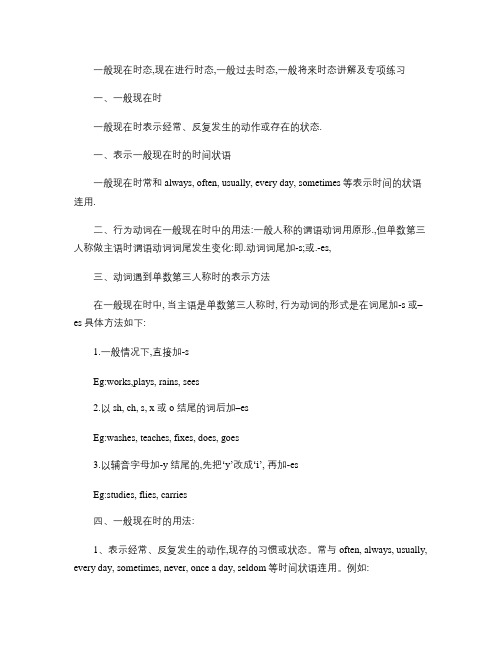
一般现在时态,现在进行时态,一般过去时态,一般将来时态讲解及专项练习一、一般现在时一般现在时表示经常、反复发生的动作或存在的状态.一、表示一般现在时的时间状语一般现在时常和always, often, usually, every day, sometimes等表示时间的状语连用.二、行为动词在一般现在时中的用法:一般人称的谓语动词用原形.,但单数第三人称做主语时谓语动词词尾发生变化:即.动词词尾加-s;或.-es,三、动词遇到单数第三人称时的表示方法在一般现在时中, 当主语是单数第三人称时, 行为动词的形式是在词尾加-s 或–es 具体方法如下:1.一般情况下,直接加-sEg:works,plays, rains, sees2.以sh, ch, s, x 或o 结尾的词后加–esEg:washes, teaches, fixes, does, goes3.以辅音字母加-y 结尾的,先把‘y’改成‘i’, 再加-esEg:studies, flies, carries四、一般现在时的用法:1、表示经常、反复发生的动作,现存的习惯或状态。
常与often, always, usually, every day, sometimes, never, once a day, seldom等时间状语连用。
例如:I am a teacher.We are Chinese.She goes to work every day.He always helps others.2、表示客观事实或普遍真理。
例如:There are seven days in a week.The earth goes round the sun.The sun rises in the east and sets in the west.The water boils at 100℃.Actions speaks louder than words. 行动胜于言辞。
(完整版)一般现在时,一般过去时,现在进行时,一般将来时练习
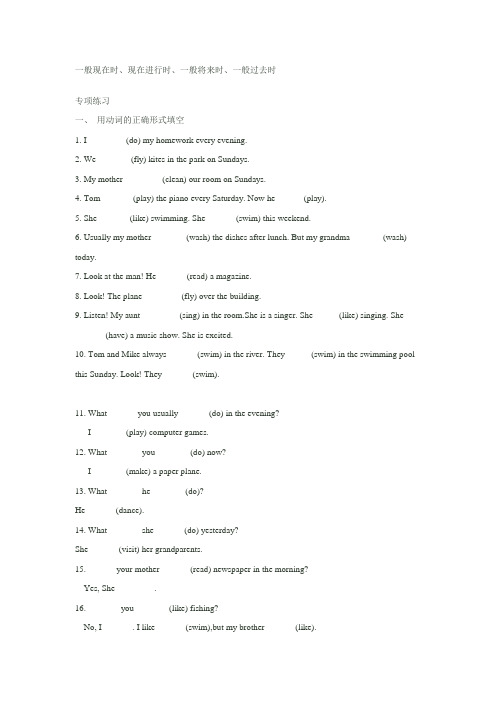
一般现在时、现在进行时、一般将来时、一般过去时专项练习一、用动词的正确形式填空1. I ________ (do) my homework every evening.2. We _______ (fly) kites in the park on Sundays.3. My mother ________ (clean) our room on Sundays.4. Tom _______(play) the piano every Saturday. Now he______ (play).5. She _______(like) swimming. She ______ (swim) this weekend.6. Usually my mother _______ (wash) the dishes after lunch. But my grandma_______ (wash) today.7. Look at the man! He ______ (read) a magazine.8. Look! The plane ________ (fly) over the building.9. Listen! My aunt ________ (sing) in the room.She is a singer. She _____ (like) singing. She_______(have) a music show. She is excited.10. Tom and Mike always ______ (swim) in the river. They _____ (swim) in the swimming pool this Sunday. Look! They ______ (swim).11. What ______ you usually ______ (do) in the evening?I _______ (play) computer games.12. What _______ you _______ (do) now?I _______ (make) a paper plane.13. What _______ he _______ (do)?He ______ (dance).14. What _______ she ______ (do) yesterday?She ______ (visit) her grandparents.15. ______ your mother ______ (read) newspaper in the morning?Yes, She ________ .16. _______ you _______ (like) fishing?No, I ______ . I like ______ (swim),but my brother ______ (like).17. How ______ your father _______ (go) to work every day?He ______ (go) by bike. But it’s cold today. He ______ (take) the No.21 bus,, and he _______ (go) to work by taxi yesterday.18. _______ the monkey _______ (like) climbing trees? Yes, it _______ .19. What _______ your father ______ (do) after lunch? He _______ (read) a comic book. What _____ he _______(do) today? He _______ (clean) the kitchen for my grandma. Look!He (clean).20. ________ you ______ (collect) stamps? Yes. I _______ .________ your brother ______ (collect), too? No, he ________ .二、选择题1. _____ he _____ to the park at 6:30 in the morning? No,he _____ .A. Does; goes; doesB. Does; go; doesn’tC. Does; go; does2. What colour _____ you _____ this bookcase? I _____ it pink.A. are; going to paint; am going to paintB. do; paint; paintC. did; paint; painted3. Tim always _____ a picture at home. He _____ a car now.A. draws; is drawingB. draw; drawC. draws; draw4. She usually _____ her friends. They often _____ tea.A. see; drinkB. sees; drinksC. sees; drink5. He usually _____ the dishes at night, but tonight he _____ clothes.A. wash; washB.washes; is going to washC. is washing; washes6. Mr. Green usually _____ his newspaper in the evening, but he and his wife _____ television yesterday evening.A.reads; watchesB.reads; is going to watchC.reads; watched7. Where are the man and the woman? They _____ near the tree.A. sitB. satC. are sitting8. _____ your penpal _____ diving? No, he _____ .He ______ writing stories.A. Does; like; doesn’t; likesB. Does; likes; doesn’t; likeC. Do; like; don’t; likes9. _____ you _____ fishing yesterday? No, we _____ .A. Does; go; doesn’tB. Did; go; didn’tC. Do; go; don’t10. Open the window, Please. Look! He _____ it.A. opensB. is openningC. is opening11. I usually _____ some milk every day. But I _____ coffee yesterday.A. drink; drankB. is drinking; drinkC. drank; am drinking12. Mr. Green often _____ his newspapers at night. But he _____ an interesting book tonight.A. reads; readsB. reads; readC. reads; is going to read13. The old man _____ playing sports in the park. He _____ morning exercise now.A. likes; is doingB. likes; doesC. like; doing14. What _____ you usually _____ in the evening? I ______ computer games.What _____ you _____ last night? I _____ a book.A. do; do; playB. did; do; playedC. does; do; playsdid; do; read do; do; read do; do; am reading15. Where ______ the boy _____ ? He _____ across the river now.A. does; swim; swimsB. is; swimming; is swimmingD. is; swimming; is swimming16. _____ you _____ to music now? Yes, we _____ .A. Do; listen; doB. Did; listen; didC. Are; listening; are17. Put on you coat, please. OK. I ______ it on.A. am puttingB. am going to putC. put18. _____ you ______ coffee? Yes, I ______ .A. Do; like; doB. Did; like; didC. Are; like; am19. Look! Two cats ______ across the wall.A. runB. runsC. are running20. She _____ tea, but he _____ .A. likes; doesn’t B; like; don’t C. like; doesn’t。
初中英语八大时态讲解及练习(全)
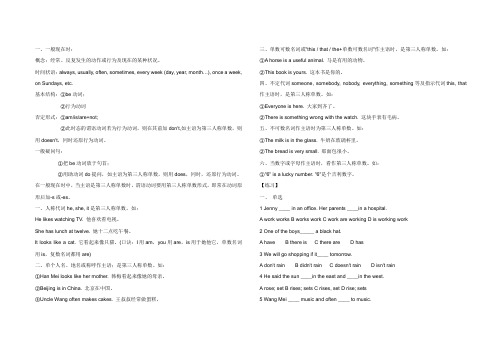
一、一般现在时:概念:经常、反复发生的动作或行为及现在的某种状况。
时间状语:always, usually, often, sometimes, every week (day, year, month…), once a week, on Sundays, etc.基本结构:①be动词;②行为动词否定形式:①am/is/are+not;②此时态的谓语动词若为行为动词,则在其前加don't,如主语为第三人称单数,则用doesn't,同时还原行为动词。
一般疑问句:①把be动词放于句首;②用助动词do提问,如主语为第三人称单数,则用does,同时,还原行为动词。
在一般现在时中,当主语是第三人称单数时,谓语动词要用第三人称单数形式,即常在动词原形后加-s或-es。
一、人称代词he, she, it是第三人称单数。
如:He likes watching TV. 他喜欢看电视。
She has lunch at twelve. 她十二点吃午餐。
It looks like a cat. 它看起来像只猫。
(口诀:I用am,you用are,is用于她他它,单数名词用is,复数名词都用are)二、单个人名、地名或称呼作主语;是第三人称单数。
如:①Han Mei looks like her mother. 韩梅看起来像她的母亲。
②Beijing is in China. 北京在中国。
③Uncle Wang often makes cakes. 王叔叔经常做蛋糕。
三、单数可数名词或"this / that / the+单数可数名词"作主语时,是第三人称单数。
如:①A horse is a useful animal. 马是有用的动物。
②This book is yours. 这本书是你的。
四、不定代词someone, somebody, nobody, everything, something等及指示代词this, that 作主语时,是第三人称单数。
一般现在时-将来时和现在进行时的讲解与练习
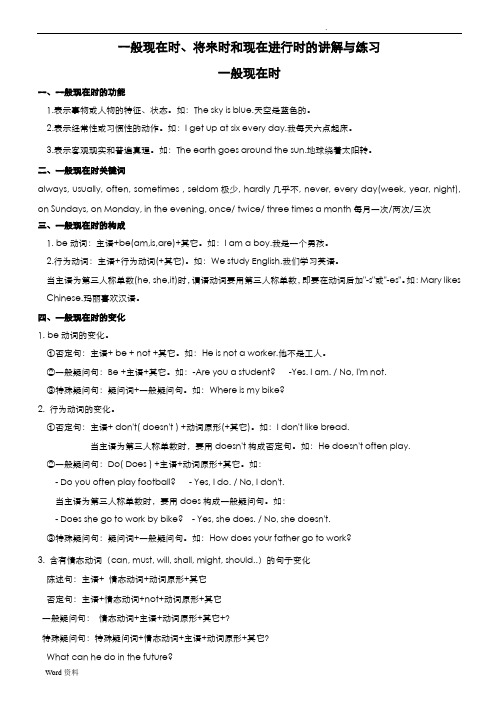
一般现在时、将来时和现在进行时的讲解与练习一般现在时一、一般现在时的功能1.表示事物或人物的特征、状态。
如:The sky is blue.天空是蓝色的。
2.表示经常性或习惯性的动作。
如:I get up at six every day.我每天六点起床。
3.表示客观现实和普遍真理。
如:The earth goes around the sun.地球绕着太阳转。
二、一般现在时关键词always, usually, often, sometimes , seldom极少, hardly几乎不, never, every day(week, year, night), on Sundays, on Monday, in the evening, once/ twice/ three times a month每月一次/两次/三次三、一般现在时的构成1. be动词:主语+be(am,is,are)+其它。
如:I am a boy.我是一个男孩。
2.行为动词:主语+行为动词(+其它)。
如:We study English.我们学习英语。
当主语为第三人称单数(he, she,it)时,谓语动词要用第三人称单数,即要在动词后加"-s"或"-es"。
如:Mary likes Chinese.玛丽喜欢汉语。
四、一般现在时的变化1. be动词的变化。
①否定句:主语+ be + not +其它。
如:He is not a worker.他不是工人。
②一般疑问句:Be +主语+其它。
如:-Are you a student? -Yes. I am. / No, I'm not.③特殊疑问句:疑问词+一般疑问句。
如:Where is my bike?2. 行为动词的变化。
①否定句:主语+ don't( doesn't ) +动词原形(+其它)。
如:I don't like bread.当主语为第三人称单数时,要用doesn't构成否定句。
初中一般现在时,一般过去时,一般将来时,现在进行时总结练习

精心整理现在进行时态1.定义:现在进行时表示正在发生或进行的动作。
2.标志词:(1)时间状语now、atthemoment(2)句前有提示词look、listen、lookat…3.谓语动词的构成:be+动词-ing1.我们正在看电视。
WeTV.2.Tom在图书馆看书。
Tombooksinthelibrary.3.康康在操场上打篮球。
Kangkangisplayingbasketball.4.他此刻正在睡觉。
Heissleeping.5.玛利亚在做什么?WhatMarianow?6.你在做作业吗?youyourhomework?四.句型转换。
1.Iamrunningontheplayground.(变否定句)Iontheplayground.2.Sheisdancinginthegym.(变一般疑问句,并做肯定回答) dancinginthegym?Yes,.3.Theyaresleepingatthemoment.(划线部分提问)theyatthemoment?五.将下列句子改成现在进行时1.??IwatchTVeveryday.I_________________TVnow.2.?Sheworksinahospital.She_________________inhospital.3.?Doyoureadthisbook?____?you??________thisbook.4.TomandSamhavelunchatabouttwelve.14.BillyandBob_______________(play)football.15.They____________(have)funtogether.七、选择填空。
(?)1.Whatareyoudoing?I’m_____aninterestingbook.A.looking???????????????B.seeing???????????????????C.reading???????? ?????????(?)2.What___yoursisterdoing?She_____cleaningthefloor.A.are,is?????????????Bdoes,is?????????????C.is,is????(?)3.Kateis?___hergreendressnow.A.puttingon???????????Bputson??????????????????????Cwear????????? ?(?)4.Isshe___herhomework?No,she___.A.do,doesn’t?????Bdoes,isn’t????Cdoing,is?????Ddoing,isn’t(?)5.Look!Thecousins_____newsweaters.??A.arewearing??????B.wearing????????C.arewear??D.iswearing一般现在时go__________catch_________brush(刷)_____wash___________do________like________have___________watch________drink___________fly___________say_______learn___________eat___________read___________sing___________buy__________ study_______stay__________make__________look____buy__________pass__________carry____come__________plant(种植)______teach_______2.用括号内动词的适当形式填空。
(完整版)初一英语各种时态复习及练习题
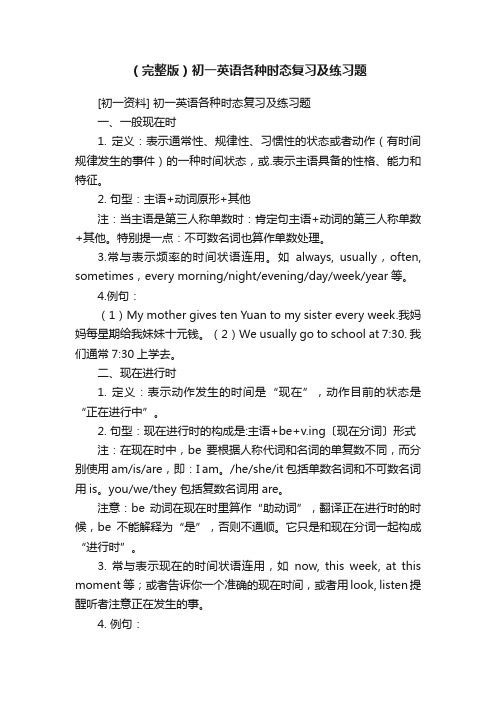
(完整版)初一英语各种时态复习及练习题[初一资料] 初一英语各种时态复习及练习题一、一般现在时1. 定义:表示通常性、规律性、习惯性的状态或者动作(有时间规律发生的事件)的一种时间状态,或.表示主语具备的性格、能力和特征。
2. 句型:主语+动词原形+其他注:当主语是第三人称单数时:肯定句主语+动词的第三人称单数+其他。
特别提一点:不可数名词也算作单数处理。
3.常与表示频率的时间状语连用。
如always, usually,often, sometimes,every morning/night/evening/day/week/year等。
4.例句:(1)My mother gives ten Yuan to my sister every week.我妈妈每星期给我妹妹十元钱。
(2)We usually go to school at 7:30. 我们通常7:30上学去。
二、现在进行时1. 定义:表示动作发生的时间是“现在”,动作目前的状态是“正在进行中”。
2. 句型:现在进行时的构成是:主语+be+v.ing〔现在分词〕形式注:在现在时中,be 要根据人称代词和名词的单复数不同,而分别使用am/is/are,即:I am。
/he/she/it 包括单数名词和不可数名词用is。
you/we/they 包括复数名词用are。
注意:be 动词在现在时里算作“助动词”,翻译正在进行时的时候,be不能解释为“是”,否则不通顺。
它只是和现在分词一起构成“进行时”。
3. 常与表示现在的时间状语连用,如now, this week, at this moment 等;或者告诉你一个准确的现在时间,或者用look, listen提醒听者注意正在发生的事。
4. 例句:(1)They are playing basketball now.现在他们正在打篮球。
(2)Listen! She is singing a song.听,她正在唱歌。
一般过去时,一般将来时,一般现在时,过去进行时,现在进行时,现在完成时综合练习
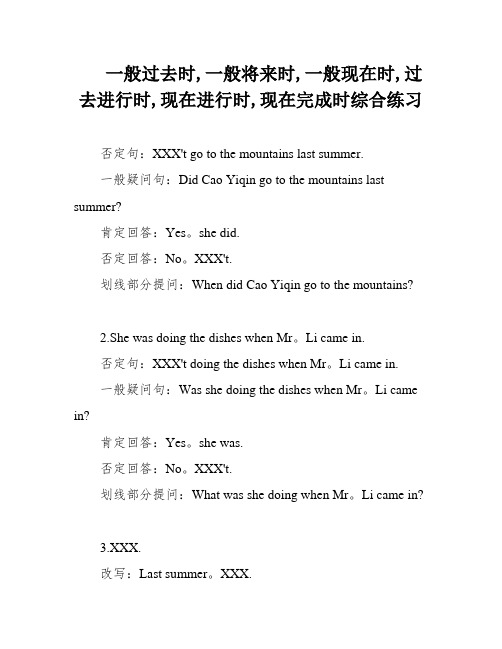
一般过去时,一般将来时,一般现在时,过去进行时,现在进行时,现在完成时综合练习否定句:XXX't go to the mountains last summer.一般疑问句:Did Cao Yiqin go to the mountains last summer?肯定回答:Yes。
she did.否定回答:No。
XXX't.划线部分提问:When did Cao Yiqin go to the mountains?2.She was doing the dishes when Mr。
Li came in.否定句:XXX't doing the dishes when Mr。
Li came in.一般疑问句:Was she doing the dishes when Mr。
Li came in?肯定回答:Yes。
she was.否定回答:No。
XXX't.划线部分提问:What was she doing when Mr。
Li came in?3.XXX.改写:Last summer。
XXX.1.My family and I went on a trip to Europe last summer。
We visited many countries。
such as France。
Italy。
XXX.否定句:My family and I did not go on a trip to Europe last summer.一般疑问句:Did your family and you go on a trip to Europe last summer?肯定回答:Yes。
we did.否定回答:No。
we did not.划线部分提问:What did you see during your trip to Europe?2.XXX。
I woke up early and went for a jog。
一般现在时、一般过去时、一般将来时 讲义和练习

一般现在时、一般过去时、一般将来时讲义和练习一、一般现在时1.概念:经常、反复发生的动作或行为,现在的某种状况,表示普遍真理或客观事实2.时间状语: Always, usually, often, sometimes, every week (day, year, month…), once a week(day, year, month…), on Sundays,3.基本结构:主语 + 动词原形+其他(如主语为第三人称单数,动词上要改为第三人称单数形式)4.否定形式:主语+am/is/are +not+其他; 此时态的谓语动词若为行为动词,则在其前加don't, 如主语为第三人称单数,则用doesn't,同时还原行为动词。
5.一般疑问句:把be动词放于句首;用助动词do提问,如主语为第三人称单数,则用does,同时,还原行为动词。
二、一般过去时1.概念:过去某个时间里发生的动作或状态;过去习惯性、经常性的动作、行为。
2.时间状语:ago, yesterday, the day before yesterday, last week,last(year, night, month…), in 1989, just now, at the age of 5, one day, long long ago, once upon a time, etc.3.基本结构:主语+be动词过去式;主语+行为动词的过去式4.否定形式:主语+was/were +not+其他;在行为动词前加didn't,同时还原行为动词。
5.一般疑问句:was或were放于句首;用助动词do的过去式did 提问,同时还原行为动词。
6.例句:She often came to help us in those days.I didn't know you were so busy.三、现在进行时1.概念:表示现阶段或说话时正在进行的动作及行为。
英语一般现在时-现在进行时-一般过去式-一般将来时综合对比练习
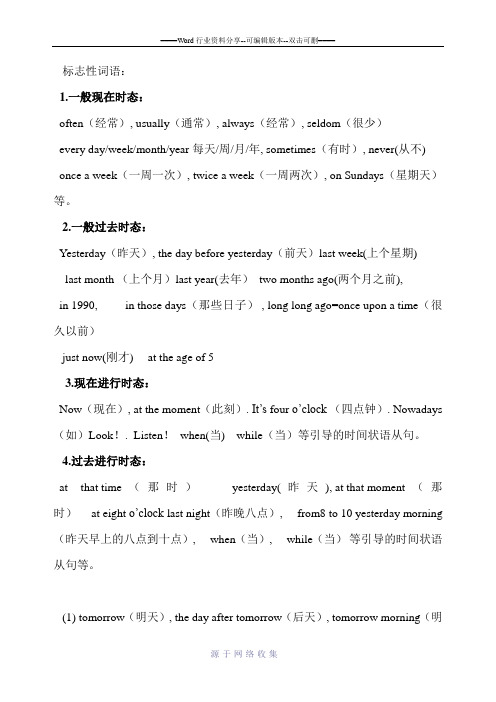
标志性词语:1.一般现在时态:often(经常), usually(通常), always(经常), seldom(很少)every day/week/month/year每天/周/月/年, sometimes(有时), never(从不) once a week(一周一次), twice a week(一周两次), on Sundays(星期天)等。
2.一般过去时态:Yesterday(昨天), the day before yesterday(前天)last week(上个星期) last month (上个月)last year(去年)two months ago(两个月之前),in 1990, in those days(那些日子) , long long ago=once upon a time(很久以前)just now(刚才) at the age of 53.现在进行时态:Now(现在), at the moment(此刻). It’s four o’clock(四点钟). Nowadays (如)Look!. Listen!when(当) while(当)等引导的时间状语从句。
4.过去进行时态:at that time(那时) yesterday(昨天), at that moment(那时) at eight o’clock last night(昨晚八点), from8 to 10 yesterday morning (昨天早上的八点到十点), when(当), while(当)等引导的时间状语从句等。
(1) tomorrow(明天), the day after tomorrow(后天), tomorrow morning(明早)(2) next time(下次), next Friday(下周五),next term(下学期), next month (下个月)(3) soon = right away = at once (4) in the future (将来)1. Look! Someone ______ in the next room .A. dancedB. dancingC. is dancingD. has danced2.Our teacher told us the sun ______ bigger than the earth.A. isB. wasC. areD. will be3. I’m afraid you can’t sit here. ------Sorry, I ______ notice.A. don’tB. won’tC. can’tD. didn’t4. When she ______ the magazine(杂志), her dad ______ asleep.A. read, was fallingB. was reading, fellC. was reading, was fallingD. read, fell5. Jim is not coming tonight.------But he______ !A. promises(许诺)B. promisedC. will promiseD. was promising6.Mary often ______ her dresses on weekends.A. washingB. washesC. has washedD. wash7. I’m Chinese. Where ______ from?A. do you comeB. you are comingC. you comeD. are you coming8. Tom and his brother ______to school.A. never walkB. are never walkingC. walk neverD. never are walking9 .It______ hard when I left my house .A. is rainingB. rainsC. was rainingD. will rain10.I think this question ______to answer.A. easyB. is easyC. was easyD. will easy11. Don’t talk so loudly . Your father ______.A. sleepsB. is sleepingC. sleptD. had slept12. Maths______always interested(使……感兴趣)him.A. hasB. haveC. areD. isst week John ______his leg.A. felt and brokenB. fell and brokeC. feels and breaksD. fallen and broken14. Jack ______his thick coat because it was snowing.A. puts onB. put onC. takes onD. took on15. He ______the picture on the wall.A. hangedB. hungC. has hangedD. was hanged16. Next month ______twenty five.A. has my sisterB. my sister will beC. my sister shall haveD. my sister is going to be17. You ______her again in a few weeks.A. will seeB. is going to seeC. sawD. will be going to see18. When______, I’ll talk to him.A. does Peter comeB. Peter will comeC. Peter comesD. can Peter come19.My sister ______to see me. She’ll be here soon.A. comesB. is comingC. had comeD. came20.—What do you do?—I’m an engineer. I __ in a company in Wuhan. I like my job very much.A. workB. had workedC. will workD. worked21.—Is your father a doctor? —Yes, he is. He__________ in Town Hospital.A. has workedB. had workedC. worksD. worked22. Every year many foreigners _________to China to learn Chinese.A. have comeB. comesC. cameD. come23.——Where’s Susan, Mike?——She ___ in the kitchen.A. cooksB. cookedC. is cookingD. has cooked24.——Did you get a job offer? ——Not yet. I ___________.A. waitedB. am waitingC. waitD. was waiting25.——Do you think John will help me move the piano?——You’d better not ask him. He ______ a composition.A. writeB. writesC. is writingD. wrote26.——Where’s the children, Mr. Black?—Oh, they ____ their PE lesson on the playground.A. haveB. hadC. are havingD. have had27.——What’s your brother doing in hi s room now? ——He ______ a kite.A. makesB. madeC. is makingD. will make28. ---Where is Frank now? ---He _______ his bike in the yard.A. fixes upB. fixing upC. is fixing upD. fixed29.——Mary, could you help me?——Wait a moment. I _________.A. read a bookB. did my homeworkC. was watching TVD. am cooking dinner30.——Listen,who _________ in the room?——Let’s go and see.A. is cryingB. cryingC. cryD. cries31. We were in Qingdao last week and __________ great fun there.A. will haveB. have hadC. hadD. have32. Yesterday,Tony’s family _________ a good time.A. hasB. haveC. had33.—Mr Green, _____you___ Three Lanes and Alleys(三坊七巷)last Sunday?—No, but I’ll visit them next week.A. will; go toB. have; been toC. did; go toD. have; gone to34.——What did the teacher say just now?——He _____us not to play computer games all day.A. tellsB. toldC. has toldD. is told35.—Where will they go next Sunday?—They ________ to the Great Wall.A. will goB. goC. has goneD. went36. If it_____________ tomorrow, we_______ travel outside.A. will rain; willB. rains; won’tC. will rain; won’t20.——Jane, can you help me to wash the clothes?——Sorry, Mom. I____________ to the shop.A. goB. wentC. am goingD. have been37. He went into his study (书房), _______ the light and began to work.A. has turned onB. will turn onC. turns onD. turned on。
(完整版)一般将来时、一般现在时、一般过去时、正在进行时练习题
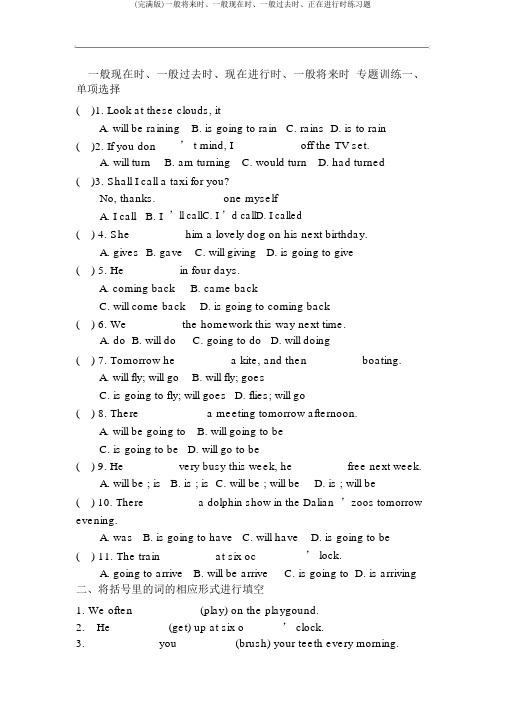
一般现在时、一般过去时、现在进行时、一般将来时专题训练一、单项选择()1. Look at these clouds, it _______________A. will be rainingB. is going to rainC. rainsD. is to rain()2. If you don’ t mind, I __________ off the TV set.A. will turnB. am turningC. would turnD. had turned()3. Shall I call a taxi for you?No, thanks. __________ one myselfA. I callB. I’ll callC. I ’d callD. I called() 4. She ________ him a lovely dog on his next birthday.A. givesB. gaveC. will givingD. is going to give() 5. He ________ in four days.A. coming backB. came backC. will come backD. is going to coming back() 6. We ________ the homework this way next time.A. doB. will doC. going to doD. will doing() 7. Tomorrow he ________ a kite, and then ________ boating.A. will fly; will goB. will fly; goesC. is going to fly; will goesD. flies; will go() 8. There __________ a meeting tomorrow afternoon.A. will be going toB. will going to beC. is going to beD. will go to be() 9. He ________ very busy this week, he ________ free next week.A. will be ; isB. is ; isC. will be ; will beD. is ; will be() 10. There ________ a dolphin show in the Dalian ’zoos tomorrow evening.A. wasB. is going to haveC. will haveD. is going to be() 11. The train ________ at six oc’ lock.A. going to arriveB. will be arriveC. is going toD. is arriving二、将括号里的词的相应形式进行填空1. We often___________(play) on the playgound.2.He _________(get) up at six o’ clock.3.__________you _________(brush) your teeth every morning.4.What(do) he usually (do) after school?5.Danny(study) English, Chinese, Maths, Science and Art at school.6.Mike sometimes __________(go) to the park with his sister.7.At eight at night, she ________(watch) TV with his parents.8.________ Mike________(read) English every day?9.How many lessons ______your classmate____(have) on Monday?10.What time ____his mother_________(do) the housework?11.Don ’ t make a noise. Grandpa __________(sleep).12.It ________(take) me two hours to finish my homework last night.13.-What ______ your mother _______(do) every evening?-She _______(wash) clothes.14._______ it ______ (rain)every day?15.There ________ (be) a football match on TV every morning.16. they often ________ (visit) the Great Wall.17. The earth __________ (move) round the sun.三、写出以下动词的第三人称单数形式:1.wash_________ match _______guess______ study______ finish_________ go________ snow______ carry_________2.stop______ see________ drive ________let_______ carry______ keep_____ join______ find_______ think________teach______ catch______3.stay_______ begin______ forget_______lie________die _______ run_______prefer______give________ring_______dance______ hope_______四、写出以下动词的过去式tell break build catch begin draweat come buy cut read putthink go get give keep know改句子1. Do you often play football after school? (必定答复 )2. I have many books. 〔改为否认句〕3.Gao Shan’ s sister likes playing table tennis〔改为否认句〕4.She lives in a small town near New York. 〔改为一般疑问句〕5.I watch TV every day. 〔改为一般疑问句〕6.David has a goal. 〔改为一般疑问句〕7.We have four lessons〔.否认句〕8.Nancy doesn ’ t run fast〔必定句〕9.My dog runs fast. (一般疑问句 )10.Su Yang usually washes some clothes on Saturday〔划.线提问〕11.Su Yang usually washes some clothes on Saturday〔.划线提问〕12.Mingming usually waters the flowers every day。
小学四种时态讲解及专项练习
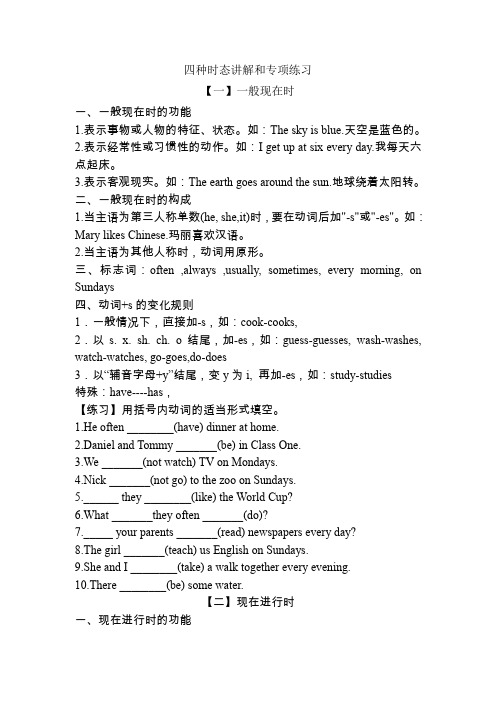
四种时态讲解和专项练习【一】一般现在时一、一般现在时的功能1.表示事物或人物的特征、状态。
如:The sky is blue.天空是蓝色的。
2.表示经常性或习惯性的动作。
如:I get up at six every day.我每天六点起床。
3.表示客观现实。
如:The earth goes around the sun.地球绕着太阳转。
二、一般现在时的构成1.当主语为第三人称单数(he, she,it)时,要在动词后加"-s"或"-es"。
如:Mary likes Chinese.玛丽喜欢汉语。
2.当主语为其他人称时,动词用原形。
三、标志词:often ,always ,usually, sometimes, every morning, on Sundays四、动词+s的变化规则1.一般情况下,直接加-s,如:cook-cooks,2.以s. x. sh. ch. o结尾,加-es,如:guess-guesses, wash-washes, watch-watches, go-goes,do-does3.以“辅音字母+y”结尾,变y为i, 再加-es,如:study-studies特殊:have----has,【练习】用括号内动词的适当形式填空。
1.He often ________(have) dinner at home.2.Daniel and Tommy _______(be) in Class One.3.We _______(not watch) TV on Mondays.4.Nick _______(not go) to the zoo on Sundays.5.______ they ________(like) the World Cup?6.What _______they often _______(do)?7._____ your parents _______(read) newspapers every day?8.The girl _______(teach) us English on Sundays.9.She and I ________(take) a walk together every evening.10.There ________(be) some water.【二】现在进行时一、现在进行时的功能现在进行时表示现在正在进行或发生的动作,也可表示当前一段时间内的活动或现阶段正在进行的动作。
(完整版)一般现在时,一般过去时,现在进行时,一般将来时练习
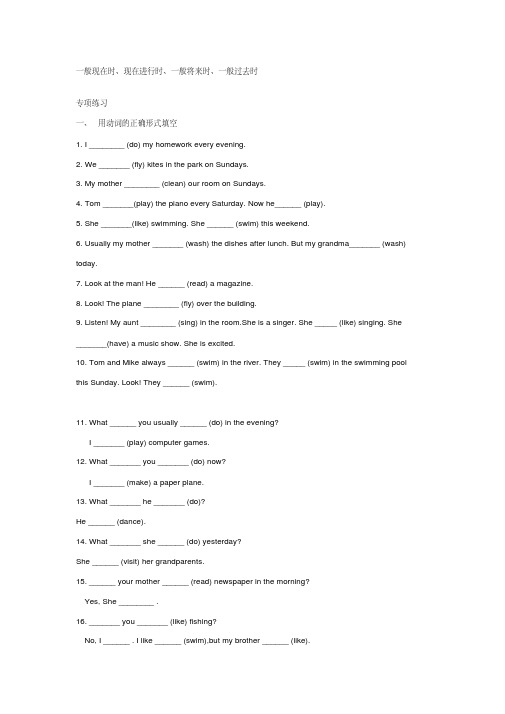
一般现在时、现在进行时、一般将来时、一般过去时专项练习一、用动词的正确形式填空1. I ________ (do) my homework every evening.2. We _______ (fly) kites in the park on Sundays.3. My mother ________ (clean) our room on Sundays.4. Tom _______(play) the piano every Saturday. Now he______ (play).5. She _______(like) swimming. She ______ (swim) this weekend.6. Usually my mother _______ (wash) the dishes after lunch. But my grandma_______ (wash) today.7. Look at the man! He ______ (read) a magazine.8. Look! The plane ________ (fly) over the building.9. Listen! My aunt ________ (sing) in the room.She is a singer. She _____ (like) singing. She _______(have) a music show. She is excited.10. Tom and Mike always ______ (swim) in the river. They _____ (swim) in the swimming pool this Sunday. Look! They ______ (swim).11. What ______ you usually ______ (do) in the evening?I _______ (play) computer games.12. What _______ you _______ (do) now?I _______ (make) a paper plane.13. What _______ he _______ (do)?He ______ (dance).14. What _______ she ______ (do) yesterday?She ______ (visit) her grandparents.15. ______ your mother ______ (read) newspaper in the morning?Yes, She ________ .16. _______ you _______ (like) fishing?No, I ______ . I like ______ (swim),but my brother ______ (like).。
- 1、下载文档前请自行甄别文档内容的完整性,平台不提供额外的编辑、内容补充、找答案等附加服务。
- 2、"仅部分预览"的文档,不可在线预览部分如存在完整性等问题,可反馈申请退款(可完整预览的文档不适用该条件!)。
- 3、如文档侵犯您的权益,请联系客服反馈,我们会尽快为您处理(人工客服工作时间:9:00-18:30)。
一般现在时态,现在进行时态,一般过去时态,一般将来时态讲解及专项练习一、一般现在时一般现在时表示经常、反复发生的动作或存在的状态.一、表示一般现在时的时间状语一般现在时常和always, often, usually, every day, sometimes等表示时间的状语连用.二、行为动词在一般现在时中的用法:一般人称的谓语动词用原形.,但单数第三人称做主语时谓语动词词尾发生变化:即.动词词尾加-s;或.-es,三、动词遇到单数第三人称时的表示方法在一般现在时中, 当主语是单数第三人称时, 行为动词的形式是在词尾加-s 或–es 具体方法如下:1.一般情况下,直接加-sEg:works,plays, rains, sees2.以sh, ch, s, x 或o 结尾的词后加–esEg:washes, teaches, fixes, does, goes3.以辅音字母加-y 结尾的,先把‘y’改成‘i’, 再加-esEg:studies, flies, carries四、一般现在时的用法:1、表示经常、反复发生的动作,现存的习惯或状态。
常与often, always, usually, every day, sometimes, never, once a day, seldom等时间状语连用。
例如:I am a teacher.We are Chinese.She goes to work every day.He always helps others.2、表示客观事实或普遍真理。
例如:There are seven days in a week.The earth goes round the sun.The sun rises in the east and sets in the west.The water boils at 100℃.Actions speaks louder than words. 行动胜于言辞。
(谚语)3、在连词when, before, if, as soon as, until 等引导的表示将来的行为的状语从句中,常用一般现在时表示将来的动作。
例如;If it is fine tomorrow, we’ll have a football match.I’ll ring you up before I leave the office.When I finish my homework, I’ll tell you a story.4、表示安排或计划好的未来的动作,只限于go, come, leave, start, stay, return, arrive, begin, be 等动词。
例如:My train leaves at 6:30 thisHow long do you stay hereWe start at 8 tomorrow morning for Beijing.5、表示主语的特征、性格、能力等。
Tom studies very hard.She is always ready to help others.I major in English.6、一般现在时还可用在戏剧,电影的剧本解说,体育比赛的解说以及图片的说明等场合。
Tom carries the ball to the left. 汤姆把球带到左方。
The picture shows us how they built the motorway last year.这张照片给我们展示了他们去年如何建设高速公路。
课堂练习:1.写出下列动词第三人称单数的变化形式;be have come go stay teach write take study watch fly play I.用所给动词的适当形式填空。
1. We often___________(play) in the playground.2. He _________(get) up at six o’clock.3. __________you _________(brush) your teeth every morning.4. What (do) he usually (do) after school5. Danny __________ (study) English, Chinese, Math, Science and Art an school.6. Mike sometimes __________(go) to the park with his sister.7. At eight at night, she __________(watch) TV with his parents.8. ________ Mike________(read) English every day9. How many lessons _________your classmate________(have) on Monday10. What time _________his mother_________(do) the housework11. Mike __________(like) cooking.12. They ______(have) the same hobby.13. My aunt _______(look) after her baby carefully.14. You always__________ (do) your homework well.15. I __________(be) ill. I’m staying in bed.16. She __________ (go) to school from Monday to Friday.17. Liu Tao __________ (do) not like PE.18. The child often __________ (watch) TV in the evening.19. Su hai and Su Yang __________ (have) eight lessons this term.20. -What day __________ (be) it today -It’s Saturday.21. He often _______(have) dinner at home.22. Daniel and Tommy _______(be) in Class One.23. We _________(not watch) TV on Monday.24. Nick _________(not go) to the zoo on Sunday.25. They _____(like) the World Cup26. What they often ____(do) on Saturdays27. Your parents _____(read) newspapers every day28. The girl ____(teach) us English on Sundays.29. She and I _____(take) a walk together every evening.30. There ____(be) some water in the bottle.time_________ his father_________(do) the work_________(get) up at five o’clock.you _________(brush) your teeth every morning.________ ( do ) he usually ________( do ) after school________ ( study ) English, Chinese, Maths, Science and Art at school.36. Kitty sometimes __________(go) to the park with his sister.eight at night, she __________( watch ) TV with her parents.38. ________ Mike________( read ) English every daymany lessons________ your classmates______( have ) on Mondayoften___________ ( play ) football in the playground.课后习题II.选择() 1. _____ you have a bookA. DoB. AreC. IsD. Have()2. They _________ on a farm.A. workingB. is workC. workD. is worked() 3. Does Peter like to watch TV __________.A. Yes, he likeB. No, he doesn’tC. Yes, he’d likeD. No, he likes()4. She doesn’t __________ her homework in the afternoon.A. doingB. to doC. doesD. do()5. How ____________ Mr. Brown ___________ to AmericaA. do,goB. is,goC. does,goD. does,goes()6. Where’s my camera I____________ it.A. am not findingB. am not seeingC. can’t findD. can’t look at()7. How ___________ he go to work He ___________ to work by bike.A. does ;goB. do;goesC. do ;goD. does;goes()8. ______ you usually late for schoolNo, _____________.A. Do ; I amB. Does ;notC. Are ; I’m notD. Are ; I aren’t()9. _____ she _____ home at six every dayA. Is , leaveB. Does , leaveC. Is , leavesD. Does , left()10. Mr. Yang ____________ English this term.A. teaches ourB. teaches usC. teachs usD. teach our()11. He can ______ Chinese and English.A. speak.B. speaks .C. tell.D. say() you want _______with actors. . C. to work. D working() nurse usually_______a white uniform.A. wear . . . D to wear()14. _____you from JapanA. AreB. Do.C. Does() language do you_______A. say . D speak()16. The elephant likes______her friends and _____grass.A. play with , eatB. play with, eats play with , eat D. to play with , eats一般现在时练改句子1. Do you often play football after school (肯定回答)__________________________________________________________2. I have many books. (改为否定句)__________________________________________________________3. Lily’s sister likes playing table tennis.(改为否定句)__________________________________________________________(改为一般疑问句)__________________________________________________________(肯定/否定回答) __________________________________________________________4. She lives in a small town(小镇)near New York.(改为否定句)__________________________________________________________(改为一般疑问句)__________________________________________________________ (对划线提问) __________________________________________________________5. I watch TV every day.(改为否定句)__________________________________________________________(改为一般疑问句)__________________________________________________________ ( 对划线提问) __________________________________________________________6. Mingming usually waters the flowers every day(改为一般疑问句)__________________________________________________________ (作出肯定回答)_____________________________________________________(改为否定句)_________________________________________________________7. Su Yang usually washes some clothes on Saturday.否定句:__________________________________________________________一般疑问句: __________________________________________________________8. Tom does his homework at home.否定句: __________________________________________________________一般疑问句: __________________________________________________________肯定回答:_________________________________________________________划线提问:__________________________________________________________9. I am play badminton every week.变成一般疑问句:____________________________________________________否定回答:_________________________________________________________变成否定句:_______________________________________________________10. Lily can cook meals.变一般疑问句:______________________________________________________作出肯定回答:______________________________________________________变否定句:_________________________________________________________二、现在进行时态一、概念现在进行时表示现在或现在一段时间内正在进行的动作或存在的状态。
